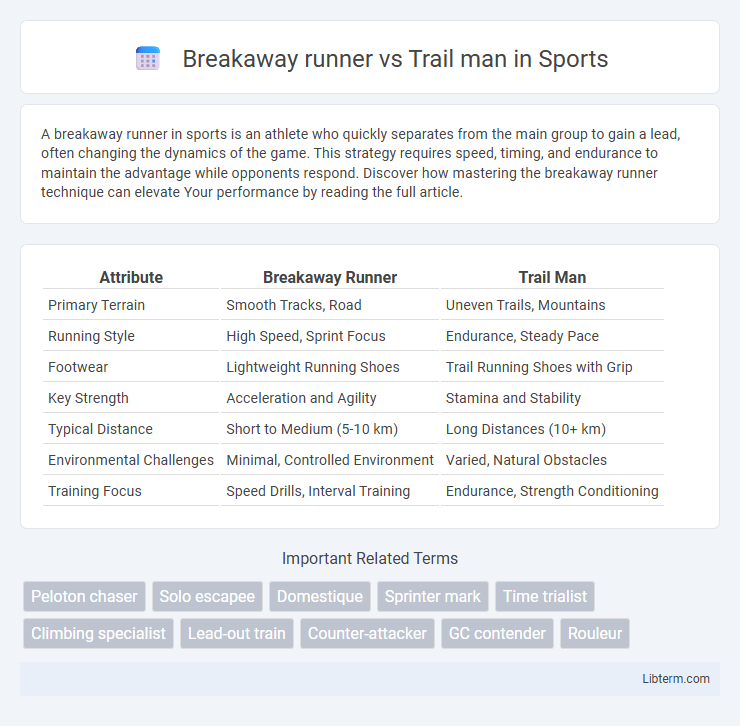A breakaway runner in sports is an athlete who quickly separates from the main group to gain a lead, often changing the dynamics of the game. This strategy requires speed, timing, and endurance to maintain the advantage while opponents respond. Discover how mastering the breakaway runner technique can elevate Your performance by reading the full article.
Table of Comparison
| Attribute | Breakaway Runner | Trail Man |
|---|---|---|
| Primary Terrain | Smooth Tracks, Road | Uneven Trails, Mountains |
| Running Style | High Speed, Sprint Focus | Endurance, Steady Pace |
| Footwear | Lightweight Running Shoes | Trail Running Shoes with Grip |
| Key Strength | Acceleration and Agility | Stamina and Stability |
| Typical Distance | Short to Medium (5-10 km) | Long Distances (10+ km) |
| Environmental Challenges | Minimal, Controlled Environment | Varied, Natural Obstacles |
| Training Focus | Speed Drills, Interval Training | Endurance, Strength Conditioning |
Breakaway Runner vs Trail Man: Overview
Breakaway Runner and Trail Man both cater to outdoor enthusiasts but target distinct running styles and terrains. Breakaway Runner specializes in lightweight, high-performance gear designed for speed and agility on paved or mixed surfaces. Trail Man emphasizes rugged, durable equipment optimized for challenging off-road trails with enhanced grip and protection.
Defining the Breakaway Runner
The Breakaway Runner is a high-intensity athlete specializing in explosive speed and rapid acceleration on hard, flat surfaces, often excelling in sprints or short-distance races. Unlike the Trail Man, who thrives in rugged, uneven terrain with endurance and adaptability, the Breakaway Runner emphasizes biomechanical efficiency and stride power to maximize velocity. This focus on straight-line speed and quick recovery makes the Breakaway Runner ideal for competitive track events and urban running challenges.
Who is the Trail Man?
The Trail Man is an avid outdoor enthusiast who specializes in running rugged, off-road paths that demand endurance, agility, and a deep connection with nature. Unlike the Breakaway runner, who focuses on speed and power on paved or smooth surfaces, the Trail Man navigates diverse terrains such as forests, mountains, and rocky trails, often using specialized trail running shoes for better grip and stability. This athlete values the challenge of natural obstacles, elevation changes, and a sustainable pace that blends physical fitness with environmental appreciation.
Key Characteristics of Breakaway Runners
Breakaway runners excel in explosive speed and agility, enabling rapid acceleration and sudden changes in direction essential for outrunning opponents. Their lightweight build and high anaerobic capacity support short bursts of intense effort during critical moments. Breakaway runners rely on sharp tactical awareness to exploit openings and maintain a lead over trail men, who possess greater endurance and stability over varied terrain.
Unique Traits of Trail Men
Trail men possess exceptional endurance and agility, enabling them to navigate rugged, uneven terrain with precision. Their keen environmental awareness and ability to adapt quickly to changing conditions set them apart from breakaway runners. Unlike breakaway runners, trail men excel in handling natural obstacles, such as rocks, roots, and steep inclines, ensuring sustained performance across diverse outdoor landscapes.
Terrain Preferences and Performance
Breakaway runners excel on paved roads and flat urban terrains, offering superior speed and efficiency due to lightweight shoes and smooth surfaces. Trail men perform best on rugged, uneven paths, navigating rocky or forested terrain with specialized grip and enhanced ankle support. Performance varies as breakaway runners prioritize velocity, while trail men emphasize stability and endurance in challenging off-road conditions.
Equipment and Gear Comparison
Breakaway runners prioritize lightweight shoes with breathable mesh uppers and responsive cushioning designed for speed on paved surfaces, often opting for minimalistic gear to reduce weight. Trail men require durable, rugged footwear featuring aggressive tread patterns, reinforced toe caps, and waterproof materials to handle uneven terrain and unpredictable weather conditions. Their gear includes hydration packs, trekking poles, and protective clothing to enhance stability, endurance, and safety during long off-road runs.
Strategic Approaches in Racing
Breakaway runners deploy aggressive pacing and tactical surges early in races to create decisive gaps from the peloton, relying on high endurance and speed consistency to maintain leads. Trail runners focus on energy conservation and terrain adaptation, exploiting hills and technical sections to outlast competitors through controlled exertion and efficient pacing. Strategic success hinges on understanding race profile, competitor behavior, and optimal energy distribution tailored to respective running styles.
Training Regimens: Breakaway vs Trail
Breakaway runners emphasize high-intensity interval training (HIIT) and explosive speed drills to enhance sprinting power and rapid acceleration. Trail runners focus on endurance-building workouts, including long-distance runs on varied terrain, strength training for stability, and proprioception exercises to adapt to uneven surfaces. Both regimens prioritize cardiovascular fitness, but breakaway training targets anaerobic capacity while trail training enhances aerobic endurance and muscular resilience.
Which Style Suits You Best?
Breakaway runners thrive on speed and open-road performance, ideal for those who prefer fast-paced, competitive environments with smooth surfaces. Trail men excel in rugged terrain, requiring agility, endurance, and a connection to nature, making this style suitable for adventurers who enjoy unpredictable paths and elevation changes. Assess your fitness goals, terrain preference, and desired challenge to determine whether a breakaway runner's speed or trail man's endurance suits you best.
Breakaway runner Infographic

 libterm.com
libterm.com